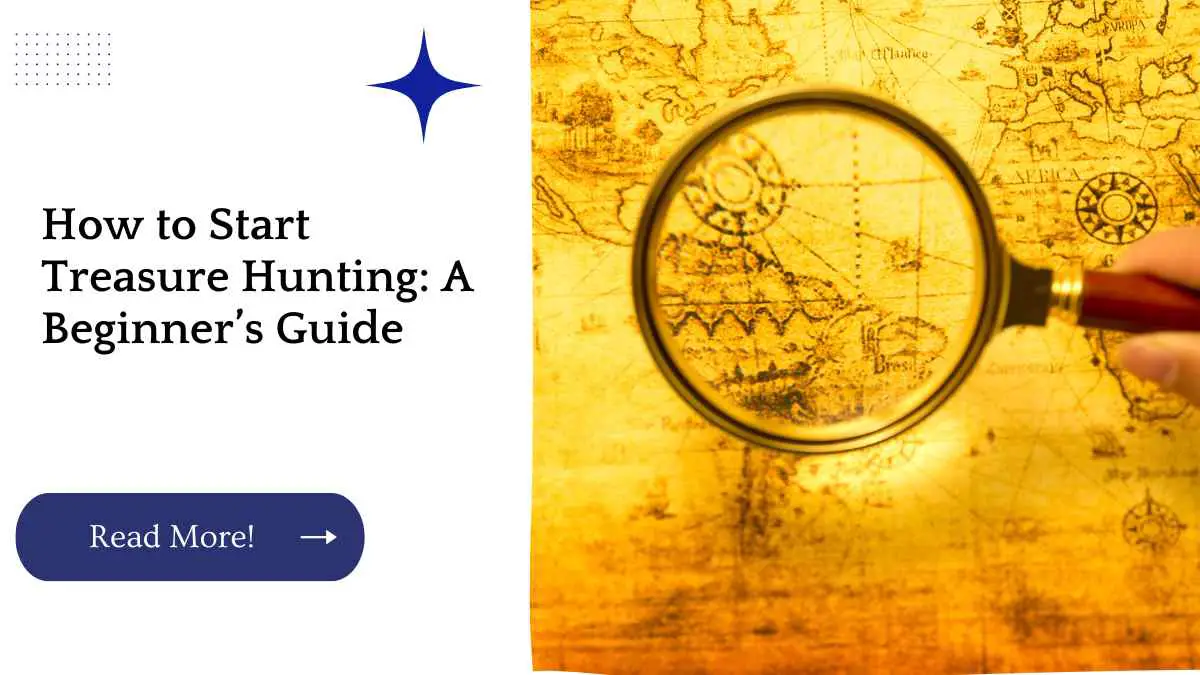Before starting your treasure hunting journey, it’s essential to understand what it entails. Treasure hunting involves searching for lost or hidden treasures, which could be anything from coins and jewelry to ancient artifacts and gold bars. It’s a hobby that can be enjoyed by anyone, regardless of age or experience.
In this guide, we will explore the different types of treasure hunting, how to prepare for your search, and how to identify and value any treasures you may find.
| Key Takeaways |
|---|
| Understanding the types of treasure you may encounter in your search. |
| Preparing for treasure hunting by researching the area, choosing the right equipment, and getting permission. |
| Conducting the search by identifying the target area, using a metal detector, and digging safely and responsibly. |
| Identifying and valuing treasure by cleaning and preserving techniques, getting appraisals, and deciding whether to sell or keep the treasure. |
Understanding the Types of Treasure
Treasure can come in many forms, and understanding the types of treasure can help you plan your search effectively. The three main types of treasure are buried treasure, sunken treasure, and lost treasures.
Are you planning to start treasure hunting? Here is a list of items required for treasure hunting to help you get started.
Buried Treasure
Buried treasure is the most common type of treasure sought after by treasure hunters. These treasures are often buried underground, either intentionally or accidentally, and can include items such as coins, jewelry, and other valuables. Buried treasure is usually found in areas that have historical significance, such as battlefields or old settlements.
Sunken Treasure
Sunken treasure refers to treasures lost at sea or in bodies of water. These treasures can be found in shipwrecks or lost underwater cities and can include items such as coins, jewelry, and even entire ships. Sunken treasure hunting requires specialized equipment and training, and it’s important to follow proper safety precautions.
Are you looking for a metal detector suitable for treasure hunting? Check out our comparison between Fisher F22 and F44 at Fisher F22 Vs F44: Which One Is Right For You? to determine which one suits you.
Lost Treasures
Lost treasures refer to items that have been lost or hidden over time, often due to theft or natural disasters. These treasures can include items such as rare artifacts, antiques, and works of art. Finding lost treasures requires extensive research and knowledge of the area in which you are searching.
Preparing for Treasure Hunting
Preparing for your treasure hunt is crucial to ensure that you have a successful and safe experience. Here are the essential steps you should take before you start your search:
Researching the Area
Researching the area in which you plan to search is essential. This will give you an idea of the history of the area and increase your chances of finding valuable treasures. Look for historical maps, old photographs, and other resources that can help you identify potential search areas.
Choosing the Right Equipment
Choosing the right equipment is essential to ensure that you can effectively search for treasures. A metal detector is a must-have tool for any treasure hunter, but you may also need other tools such as shovels, trowels, and digging tools. Make sure you invest in high-quality equipment that is durable and reliable.
To get accurate readings and correctly detect hidden treasures during treasure hunting activities, you need a well-calibrated metal detector. Check our XP Deus metal detector calibration guide to help you calibrate your metal detector like a pro.
Getting Permission
Before you start your treasure hunt, make sure you have permission to search in the area. This could involve obtaining permits from local authorities or seeking permission from private landowners. It’s important to respect the laws and regulations of the area in which you plan to search and obtain any necessary permits or permissions.
Treasure hunting isn’t just about the thrill of the find; it’s also rooted in rich history. Dive into the The History of Treasure Hunting: A Look Back in Time to uncover the tales and legends that make this activity so captivating.
Conducting the Search
Once you’ve prepared for your treasure hunt, it’s time to start your search. Here are the essential steps for conducting the search:
Identifying the Target Area
Use your research to identify the target area where you think you may find treasures. Look for areas with historical significance or areas where treasure may have been lost or hidden. Start your search in areas that are most likely to yield results.
Using a Metal Detector
A metal detector is an essential tool for any treasure hunter. Use it to scan the target area and locate any metal objects buried underground. Make sure you calibrate your metal detector correctly and learn how to interpret the signals it gives you.
Digging Safely and Responsibly
When you locate a potential treasure, make sure you dig safely and responsibly. Use the proper tools to avoid damaging any treasures and make sure you fill in any holes you dig. Always follow proper safety procedures and avoid causing any damage to the environment.
Identifying and Valuing Treasure
Once you’ve found a potential treasure, it’s important to identify and value it accurately. Here are the essential steps for identifying and valuing treasure:
Coil issues can ruin your experience when treasure hunting with Nokta Makro Simplex. Our article on dealing with coil issues on your Nokta Makro Simplex explains ways to take care of the issues and have a better treasure hunting experience.
Cleaning and Preservation Techniques
Clean and preserve any treasures you find to ensure their longevity and value. Research proper cleaning and preservation techniques to avoid damaging the treasure and maintain its integrity.
Getting Appraisals
Get appraisals from professional appraisers to determine the value of any treasures you find. Appraisers can give you an accurate estimate of the value of your treasure and help you decide whether to keep or sell it.
Selling or Keeping the Treasure
Decide whether to sell or keep the treasure you find based on its value and significance. If the treasure has historical significance, you may want to consider donating it to a museum or historical society. If it has monetary value, you may want to sell it to a collector or dealer.
Conclusion
Treasure hunting can be an exciting and rewarding hobby for anyone interested in history and adventure. By understanding the types of treasure, preparing for your search, conducting the search safely and responsibly, and identifying and valuing any treasures you find, you can have a successful and enjoyable treasure hunting experience.
Remember to always respect the laws and regulations of the area in which you are searching and follow proper safety procedures to ensure a safe and responsible treasure hunt.
Treasure hunting is exciting, but it can be stressful, especially when you are a beginner. Learn how to manage stress during treasure hunts in our guide on crystalline healing for stress management – a beginner’s guide, and achieve the best results without feeling overwhelmed.
FAQs
How do I get started with treasure hunting?
To get started with treasure hunting, you need to research the types of treasure, prepare for your search, and learn how to use a metal detector effectively. Look for areas with historical significance, and obtain any necessary permits or permissions before you start your search.
What kind of equipment do I need for treasure hunting?
The most essential piece of equipment for treasure hunting is a metal detector, but you may also need other tools such as shovels, trowels, and digging tools. Make sure you invest in high-quality equipment that is durable and reliable.
How do I identify potential search areas?
You can identify potential search areas by researching the history of the area, looking for old maps and photographs, and identifying areas where treasure may have been lost or hidden. Look for areas with historical significance, such as battlefields or old settlements.
How do I clean and preserve treasures I find?
Research proper cleaning and preservation techniques to avoid damaging the treasure and maintain its integrity. It’s essential to clean and preserve any treasures you find to ensure their longevity and value.
How do I determine the value of the treasure I find?
Get appraisals from professional appraisers to determine the value of any treasures you find. Appraisers can give you an accurate estimate of the value of your treasure and help you decide whether to keep or sell it.
Is treasure hunting legal?
Treasure hunting is legal in most areas, but it’s important to respect the laws and regulations of the area in which you plan to search. Obtain any necessary permits or permissions and follow proper safety procedures to ensure a safe and responsible treasure hunt.
Further Reading
Become a Treasure Hunter: How to Make Money Searching for Artifacts – This article provides tips and resources for individuals interested in becoming treasure hunters and making money searching for artifacts.
How would someone start treasure hunting? – This Quora thread offers advice and tips from experienced treasure hunters on how to get started with this exciting hobby.
How to Be a Modern-Day Treasure Hunter – This article provides practical advice on how to get started with treasure hunting, including tips on research, equipment, and safety.

Hi there! My name is Hellen James, and I’m here to talk to you about treasure hunting. I’ve been a fan of treasure hunting ever since I was a kid, and if you’re a fan of treasure hunting or just like the idea of finding a long-lost fortune, then this blog is for you.

